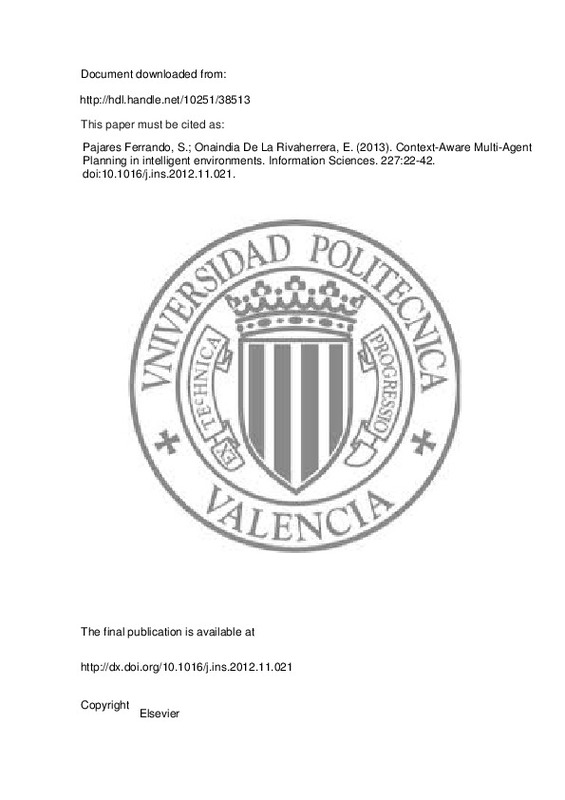JavaScript is disabled for your browser. Some features of this site may not work without it.
Buscar en RiuNet
Listar
Mi cuenta
Estadísticas
Ayuda RiuNet
Admin. UPV
Context-Aware Multi-Agent Planning in intelligent environments
Mostrar el registro sencillo del ítem
Ficheros en el ítem
| dc.contributor.author | Pajares Ferrando, Sergio
|
es_ES |
| dc.contributor.author | Onaindia de la Rivaherrera, Eva
|
es_ES |
| dc.date.accessioned | 2014-07-02T07:29:07Z | |
| dc.date.issued | 2013-04-01 | |
| dc.identifier.issn | 0020-0255 | |
| dc.identifier.uri | http://hdl.handle.net/10251/38513 | |
| dc.description.abstract | A system is context-aware if it can extract, interpret and use context information and adapt its functionality to the current context of use. Multi-agent planning generalizes the problem of planning in domains where several agents plan and act together, and share resources, activities, and goals. This contribution presents a practical extension of a formal theoretical model for Context-Aware Multi-Agent Planning based upon an argumentationbased defeasible logic. Our framework, named CAMAP, is implemented on a platform for open multiagent systems and has been experimentally tested, among others, in applications of ambient intelligence in the field of health-care. CAMAP is based on a multi-agent partial-order planning paradigm in which agents have diverse abilities, use an argumentation-based defeasible contextual reasoning to support their own beliefs and refute the beliefs of the others according to their context knowledge during the plan search process. CAMAP shows to be an adequate approach to tackle ambient intelligence problems as it gathers together in a single framework the ability of planning while it allows agents to put forward arguments that support or argue upon the accuracy, unambiguity and reliability of the context-aware information. | es_ES |
| dc.description.sponsorship | This work is mainly supported by the Spanish Ministry of Science and Education under the FPU Grant Reference AP2009-1896 awarded to Sergio Pajares Ferrando, and Projects, TIN2011-27652-C03-01, and Consolider Ingenio 2010 CSD2007-00022. | en_EN |
| dc.format.extent | 21 | es_ES |
| dc.language | Inglés | es_ES |
| dc.publisher | Elsevier | es_ES |
| dc.relation.ispartof | Information Sciences | es_ES |
| dc.rights | Reserva de todos los derechos | es_ES |
| dc.subject | Context-aware reasoning | es_ES |
| dc.subject | Ambient intelligence | es_ES |
| dc.subject | Multi-agent planning | es_ES |
| dc.subject | Defeasible argumentation | es_ES |
| dc.subject.classification | LENGUAJES Y SISTEMAS INFORMATICOS | es_ES |
| dc.title | Context-Aware Multi-Agent Planning in intelligent environments | es_ES |
| dc.type | Artículo | es_ES |
| dc.identifier.doi | 10.1016/j.ins.2012.11.021 | |
| dc.relation.projectID | info:eu-repo/grantAgreement/ME//AP2009-1896/ES/AP2009-1896/ | es_ES |
| dc.relation.projectID | info:eu-repo/grantAgreement/MICINN//TIN2011-27652-C03-01/ES/INTERACCION MULTIAGENTE PARA PLANIFICACION/ | es_ES |
| dc.relation.projectID | info:eu-repo/grantAgreement/MEC//CSD2007-00022/ES/Agreement Technologies/ | es_ES |
| dc.rights.accessRights | Abierto | es_ES |
| dc.contributor.affiliation | Universitat Politècnica de València. Departamento de Sistemas Informáticos y Computación - Departament de Sistemes Informàtics i Computació | es_ES |
| dc.description.bibliographicCitation | Pajares Ferrando, S.; Onaindia De La Rivaherrera, E. (2013). Context-Aware Multi-Agent Planning in intelligent environments. Information Sciences. 227:22-42. https://doi.org/10.1016/j.ins.2012.11.021 | es_ES |
| dc.description.accrualMethod | S | es_ES |
| dc.relation.publisherversion | http://dx.doi.org/10.1016/j.ins.2012.11.021 | es_ES |
| dc.description.upvformatpinicio | 22 | es_ES |
| dc.description.upvformatpfin | 42 | es_ES |
| dc.type.version | info:eu-repo/semantics/publishedVersion | es_ES |
| dc.description.volume | 227 | es_ES |
| dc.relation.senia | 253839 | |
| dc.contributor.funder | Ministerio de Educación | es_ES |
| dc.contributor.funder | Ministerio de Educación y Ciencia | es_ES |
| dc.contributor.funder | Ministerio de Ciencia e Innovación | es_ES |







![[Cerrado]](/themes/UPV/images/candado.png)

